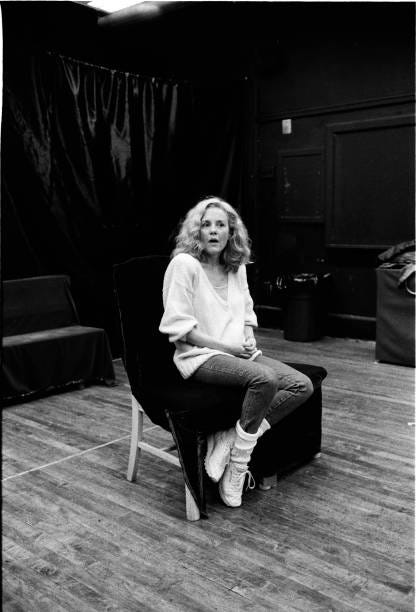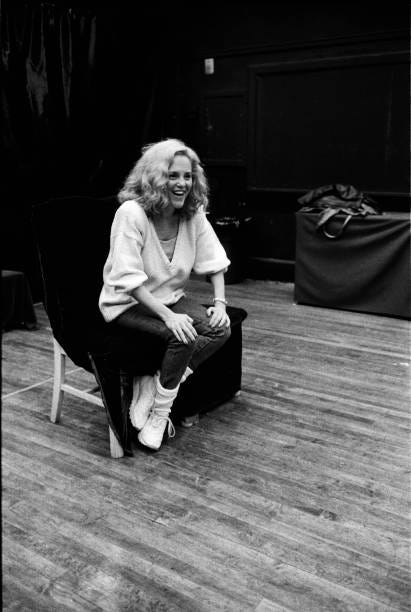Marian Seldes on Madeline Kahn
"I thought Madeline was wonderful. She was so dedicated, and she was so often treated poorly. I don’t know why."

I saw Born Yesterday when I was still a teenager; when I had just begun to study acting. I could not believe how wonderful Judy Holliday was. She just transfixed me. So funny and also so real. I remember walking home from the theatre, thinking about the play, about her, and I got lost a bit: I walked several blocks past my street. It never occurred to me that I would one day work with Judy or that I would work with and marry Garson [Kanin, the author of Born Yesterday], or that I would be around to see a revival of the play and spend time with its new star—Madeline Kahn.
It was not a terribly pleasant production. I’ll just say that. It was not cared for. Madeline, however, was very serious about her work, and I know that Garson was pleased with the new colors and angles she brought to Billie Dawn, that seemingly dumb but strangely brilliant chorus girl.
Here’s what I will say: Judy Holliday played Billie Dawn as an innocent, a bird just hatched, who suddenly learns to fly beyond the nest. Hers was an opulent nest: There were furs and luxuries, but it was an empty nest. Her Billie was not loved well. As Billie became appreciated—and then loved—you could see Judy burgeon and bloom. It was as if fifty strong bulbs of light were going off within her. It was joyous to see.
Madeline played Billie as someone who had left the nest, and who might have experienced some good things, and who learned a lot of things, but somehow she made bad choices that landed her back to a place she thought she had escaped. Madeline’s Billie had imprisoned herself. Madeline’s Billie knew better than Judy’s had. Madeline’s Billie was tougher, sexier to begin with, and her knowledge, her self-confidence, softened her. Judy burgeoned; Madeline softened.
I thought Madeline was wonderful. She was so dedicated, and she was so often treated poorly. I don’t know why.
Madeline asked to see me during the production of the play. I didn’t know what the meeting was for, but I went. Garson was not included. My fear was that Madeline might have wanted to talk about the play, the production, and I didn’t feel safe doing that. Garson and I were living together then. We were not yet married, but everyone knew that I was almost always with Garson. [Marian moved in with Garson Kanin in 1985 after the death of Ruth Gordon. They were married in 1990.]
Madeline did not want to talk about the play: Madeline had been invited to speak to a group of young actors, and she wanted me to help her with what she might say to them. She knew I was teaching at Juilliard, and she was so worried about saying the right things. She very pointedly said that she didn’t want to poison anyone by talking about the frequent disappointments in acting, but she also didn’t want to arrive and spout a lot of platitudes. She was looking for some balance.

I told her what I tell everyone: It’s brutal, yes, but it is also glorious. You hang on for the glorious, and you understand—you make yourself understand—where the good is. There will be cruelty; there will be disappointment. But those things happen to everyone in every profession. The goal always has to be doing one’s best; helping others to do their best; connecting with an author and an audience; being grateful that you’ve had the opportunity.
Madeline thought a bit—that sweet, expressive face—and she said, “I’m thinking of telling them that what you have to feel for acting is what you feel for the person you love, who may be ugly, who may be rude, but who gives you something you can’t find anywhere else. You develop a set of eyes that see what others can’t or won’t see. And that’s my affair with acting.”
And I told her that was perfect. I didn’t go to her session with the students, but I was very happy when I saw her later, and she said that the students had taught her. I told her that was my experience as well. I learned so much from every student I had. Teaching is a shared experience.
When Born Yesterday closed, Garson and I had dinner with Madeline. As I told you, she was not treated well. There was a lack of caring, and there was also some bad behavior toward her. I will never understand it. But Madeline was satisfied, or she said she was. “I got to live in your play,” she told Garson. “That was a lovely place to be, and I will take it with me everywhere I go.”


